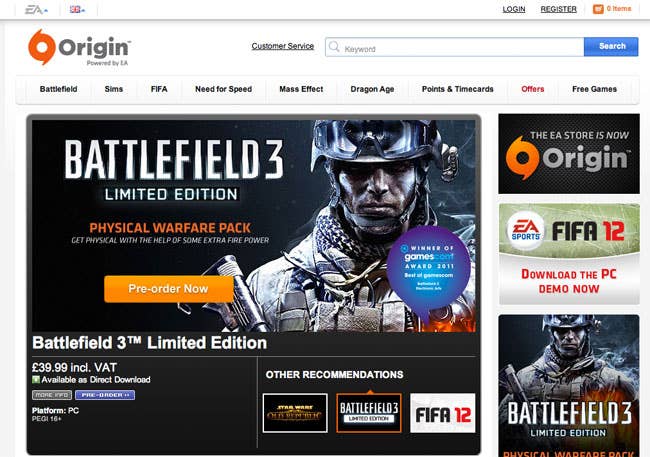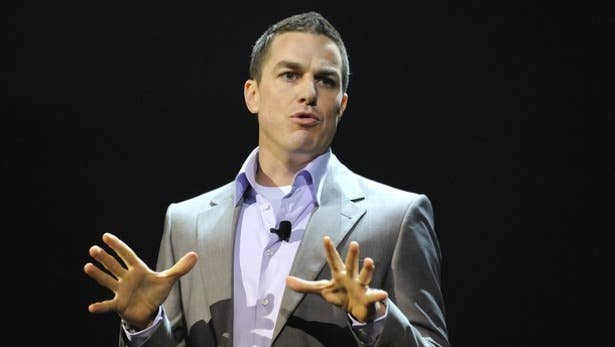EA's Wilson: Origin is not about transactions, it's about service
EVP Andrew Wilson intends to "re-establish Origin as a service to gamers, not as a means to drive transactions"
When Electronic Arts reorganized a couple of months ago, it gave EVP Andrew Wilson the task of managing Origin to add to his responsibilities as head of EA Sports. Electronic Arts re-branded its combination of the EA Store and the EA Download Manager as Origin in 2011. Origin has grown tremendously, and in the process has had to deal with creating a support structure able to handle the current and future customer bases; there was a lot of plumbing to do early on. The system is now supporting over 40 million customers. Where does Origin go from here? What mission has Andrew Wilson been given for Origin? GamesIndustry International sat down with Wilson at E3 to talk about the Origin service and how it will evolve.
Wilson's history with Origin actually goes back to the early days of the service. "I had the great fortune of being on Origin back in the day; I was part of the first core team that had this kernel of an idea of what Origin could be," Wilson recalled. "It wasn't called Origin then - the subsequent team came in and branded it and built that service. But what we really had in mind in the early days was a service that made your EA games better; a service that made it easy to access games and update games. A service that enhanced the experience of playing games, a service that helped you connect to other friends playing games, and a service that ultimately did that across all platforms, not just PC."
"The transaction component of that service has taken a disproportionate amount of the communication and mindshare of what we really try and provide"
Andrew Wilson
Wilson acknowledged that the service has changed over time from that original vision. "Over the years ... there've been some permutations of that vision that have manifested as part of Origin," Wilson said. "I think what we've done is taken a step back and said 'Wow, we've actually done some really cool things with Origin.' It is by no means perfect, but we've done some pretty cool things. As you say, the plumbing is there. What can we do now to really think about Origin in the next generation?"
The task of moving Origin forward requires going back to its founding ideas, Wilson believes. "Part of the reason why I think it came back in to me was my history with Origin," said Wilson. "And the ability to take a step back and say OK, now that we have the plumbing what does 'make your EA games better' mean? What does 'make it easier to access those games' mean? What does 'enhanced gameplay' mean? What does 'connect with friends' mean in the context of Origin, and what does that mean for the PC, for console, and for mobile? Really coming back to our roots as a service for gamers, versus anything else that it may have been perceived to have been over the last few years by virtue of its various permutations or changes in direction."
When Origin was first released it seemed like it solved a lot of problems for EA, but it looked like it was built around what's useful for EA rather than what's useful for customers. There are now a lot of social networks to bring customers together, and digital distribution, and many other services that do some or all of what Origin does. For customers Origin can seem like just one more thing they have to install, another roadblock in the way of getting and playing a game. Until customers feel there's something in it for them, they won't install it. How does Wilson plan to make that change to Origin?

"I think your perception is absolutely correct," Wilson agreed. "I think when I look at the journey that service has taken, I think the transaction component of that service has taken a disproportionate amount of the communication and mindshare of what we really try and provide, and the barrier that that puts in between you and the game that you want to play."
Wilson is trying to change the core definition of Origin within EA. "When I speak to the team now, they're very energized about this concept of 'Listen, the transaction is really a very small part of the experience; that's really not what this is about,'" he said. Wilson notes that you have to have some software to download and install PC games, and that Origin has made that better. "In the old EA, there were multiple downloaders and multiple installers," Wilson pointed out. "Before you bought every game, you had to get a new downloader and a new installer. That was a barrier. Origin is one downloader, one installer. That solves a problem for the gamers who buy more than one game." Origin also makes the process of getting patches easier. "Again, we're not perfect, but we're getting better," Wilson said.
Wilson points out other features Origin provides, including tracking your friends' status, chat and an overlay system for showing walk-throughs. "I don't want to have multiple technologies installed" to handle these various features, Wilson said. "I don't have to have separate technology. Origin does that. So if you take away the transaction part of that, which for us in all honesty is a very small part of the service, and you think about consistent downloads, consistent access and understanding of friends' presence, you think about game enhancements like chat and one-click join and in-game overlay, and all of a sudden you start to get to what Origin is - which is a service that makes your EA games better."
Making EA games better is the core that Origin needs to embrace and expand on, Wilson believes. "What you're going to see from us is to have a real focus on that, and a focus on getting that right and getting that better, and getting it done for PC. Then figuring out in the context of other platforms, what does that mean?" Wilson asked. "You don't want a service that competes with other platforms like Microsoft or Sony or iOS. You don't want a competitive service to them, what you want is a complementary service that enhances your game experience irrespective of where you made the transaction. That's the shift you're going to see from us."
The technology needs to fade into the background as far as the customer is concerned. Apple has made a lot of money because they made buying things for iOS very painless. Doing that and making communication a seamless part of your game experience would be a significant benefit that Origin could provide. "You're absolutely right," Wilson agreed. "We think of Origin, in this new world, as the gracious host of the party. It's not the center of attention; it's not the DJ, it's not the dance director, it's just a gracious host. It's someone who greets you at the door and ushers you in to where you want to go and points you in the direction of your friends so that you can go and party with them together. That's really how we see it."
"We think of Origin, in this new world, as the gracious host of the party"
Andrew Wilson
There is a big difference between how Wilson would like Origin to be perceived and what customers actually think of the service, though. That's something that will have to be dealt with. "There are a number of years of built-up perception around what Origin is and why we need Origin and the focus of Origin," Wilson acknowledged. "I am not so naïve as to believe we will change that perception quickly. Certainly at a core Origin team level our job is to make your games better. There are things that Origin delivers that will in fact do that, and it can be completely silent and not come between you and your game."
"What we are really looking at now is how do we make sure that that's possible," Wilson continued. "How do we make sure that if you never want to see that gracious host again, you don't have to - you go straight to the game. But if you want to call them up and you want to find out where your friends are, where the latest cool party is or whatever that might be, you can do that. I think that's the difference. One was let's put Origin front and center due to the perception that we were trying to drive the transaction, and where we are today is Origin is really only there to help your games be better, more seamless, and more fun, and allow you to play them with your friends more easily. That will be the razor by which we decide how on how we build new features and what we do. In the near term, quite frankly, our focus is making that download better, making that install better, making that automatic patching better. Making that friends presence better, making the various game services better. That's what you're going to see from us over the next year, which is really re-establish Origin as a service to gamers, not as a means to drive transactions."
Wilson appreciates just how difficult this task will be. "I want to re-iterate, it's very important for people to understand that we don't expect that all of a sudden people are going to get up and go 'Oh! Great! We now love Origin!'" Wilson said. "Some people really do like Origin, for all of those reasons; other people don't because of some less than optimal experience they've had. Initial experiences are hard to overcome, and that's going to take time. What we would say is, 'We get it. We understand it. We have heard, we have made some changes already in terms of how we do things, and we're looking at more changes that we'll talk about over the coming months that really are gamer-focused.' That I think will prove as a litmus test and a change and a filter by which people see Origin. It will help them understand this is not just hot air. We actually want to build a service to gamers. Then the proof is in the pudding. We've got to do it. It's got to be there."
The world will be watching to see just what sort of pudding EA produces, and what it tastes like once Wilson's changed the recipe.
Read more about Andrew Wilson's plans for Origin, including what he says about Origin discounting games, on the [a]list daily.

